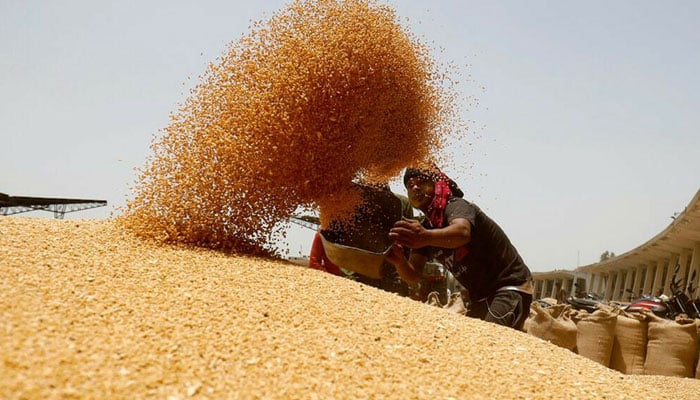AGP blows lid off Rs300bn wheat scandal
Report highlights intentional delay in executing public sector wheat imports via TCP
July 09, 2025

- Report confirms over-imports despite surplus stocks of wheat.
- 3.59 MMT wheat imported exceeding quota of 2.4MMT in 2023-24.
- Findings term justification for imports as "completely unreliable".
ISLAMABAD: Auditor General of Pakistan (AGP) cites "malafide" intent, "completely unreliable" data, delayed federal-provincial actions and manipulation to benefit private sector at the cost of local farmers and the national treasury as reasons behind Rs300 billion 2023-24 wheat scam.
While the scandal had already attracted media and public attention, the AGP’s findings now provide official confirmation and new evidence including claims of "malafide" intent, fake data, and delayed government action.
The report confirms that massive over-imports of wheat was done despite surplus stocks. The AGP found that 3.59 million metric tonnes (MMT) of wheat were imported in 2023-24, far exceeding the approved quota of 2.40 MMT, even though Pakistan recorded its highest-ever local wheat production of 31.47 MMT and carried forward a stock balance of 4.64 MMT.
The report shows the justification for imports as "completely unreliable", hinting at deliberate inflation of national demand estimates. The audit observes: "The requirement was presented (seems malafide)".
Key data used to justify imports were riddled with inconsistencies, especially between opening and closing stocks over the years. The AGP noted discrepancies in wheat stock figures presented at official meetings, which were used to make major import decisions. "Overstated" or "understated stock" figures led to poor decisions like excessive imports, or delays that created shortages. The report revealed that Punjab and Sindh — two major wheat producers — released drastically lower amounts of wheat to flour mills in mid-2023, creating a false sense of shortage that pushed wheat and flour prices up.
Punjab's wheat release between June and October 2023 was just 5,657 tonnes, compared to over two million tonnes in the same period of 2022. A panic was created in the local market, causing an increase in flour prices.
Perhaps the most damning revelation is the intentional delay in executing public sector wheat imports through the Trading Corporation of Pakistan (TCP). Despite the ECC and federal cabinet approving one MMT of wheat import through TCP, the MNFS&R sat on the file for over a month, finally instructing TCP to withhold procurement altogether — after private imports had already flooded the market. It is apprehended that the ministries of MNFS&R and Commerce intentionally delayed the process to favour private importers, the AGP report states.
The Ministry of Commerce had advised placing caps and timelines on private imports and requiring importers to sell directly to flour mills, ensuring price benefits for consumers. However, MNFS&R ignored this advice, allowing open-ended imports that ultimately destabilised the local market and crushed farmer returns.
The AGP report revealed that public sector wheat procurement fell 25% below target in 2023-24 and 40% below target in 2024-25, with Punjab procuring zero wheat in 2024-25. Adding to this, the government failed to announce the Minimum Support Price (MSP) before the sowing season
— a vital policy measure to give farmers price certainty.
Instead, MSP was finalised in March 2023, just before harvest, leaving farmers exposed to market speculation.
The government had justified part of the import quota by citing the need to build strategic reserves. However, the AGP debunked this claim, noting that the wheat was imported just before harvest and stored not by the state, but by private importers, due to the government’s limited storage capacity (only 0.5 MMT).
"The facts about strategic reserves were false and misleading […] The benefits meant for local farmers were granted to importers and hoarders".
Another startling finding was the inclusion of Afghanistan’s wheat demand in Pakistan’s domestic consumption figures, without any documentation or justification. Meanwhile, US Department of Agriculture reports confirmed that over 500,000 tonnes of wheat were exported to Afghanistan —unaccounted for in official figures. This was used to inflate national demand and justify additional imports.
The report revealed that the AGP's findings were formally shared with the Ministry of National Food Security and Research on January 20 and January 28, 2025, requesting a response, record verification, and departmental meetings. No reply was received.
The AGP report reveals far more than administrative inefficiencies. It points toward deliberate decision-making that enriched private importers, undermined food security and sabotaged local farmers, while costing the nation hundreds of billions of rupees.
Regarding the role of the provincial governments — Punjab and Sindh — the audit reports primarily refer to periods when caretaker governments were in place in both provinces. The present governments are not in a position to respond to these issues; however, officials from both administrations, speaking on condition of anonymity, have assured that if required, necessary action will be taken.
Originally published in The News











